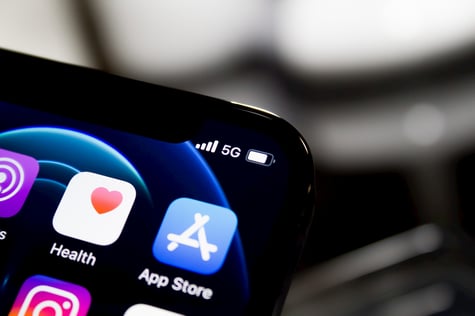Although there is a lot of hype in the “race” to 5G, no 5G network has been fully deployed in any region yet. So which markets are in the race, what exactly is the prize, and how close are the competitors to that exciting finish line?
We take a look into what the race actually is, why it’s taking place, and how society is hoping to benefit from it.
What does winning the race to 5G mean?
Now that the 5G standards have been officially agreed, and advanced network tests are well underway (in Singapore, for example), the true potential of 5G networks is starting to become apparent to industry, particularly within small-scale deployments.
We’re yet to see any 5G networks capable of supporting some of the large-scale applications that have caught the eyes of Government strategists and consumers, though. The promise of large-scale virtual realities, smart cities, robust robotics networks and high-fidelity streaming services are, as yet, entirely unfulfilled.
Effectively, for a market to truly win the race to 5G, it needs to create an environment where these applications not only function, but thrive.
How are analysts measuring the race to 5G?
Consultants at Analysys Mason have analysed the ‘race to 5G’ by creating a 5G Readiness Index. This index is based on two governmental factors that are essential to the implementation of 5G and one more general factor:
- Governmental readiness to license the 5G spectrum for use.
- Implementation of government policies to encourage the creation of 5G infrastructures, including identifying suitable locations.
- Investment in 5G across industry and the public sector.
The index is a hugely useful resource for measuring which markets are preparing to become 5G goliaths, and which are going to be fighting just to keep pace. Interestingly, the 5G race is thought to be an indicator of future economic prospects for a country, too.
Implementing 5G on anything but the smallest scale is a big a job, and the potential impact of winning the 5G race makes it crucial governments are involved. In this case, ‘winning’ means being in the best possible position to reap the economic and other benefits of widespread 5G. These benefits are somewhat speculative, but, for countries, range from economic growth due to increased productivity, to public health benefits with optimised health sectors, and greener cities created by smart city initiatives.
China: winning the race to 5G (narrowly)
According to Analysys Mason’s research, China is just about leading the way in terms of 5G readiness. Although the Chinese government has not yet auctioned off its 5G spectrum, the government’s widespread support for 5G, as well as the backing of industry, suggests they are well on the way to 5G. State-owned mobile networks including China Unicom, China Mobile, and China Telecom are already testing 5G in at least 16 cities.
As these trials have not yet been scaled up into city-wide networks, it seems clear that China is not yet ready to reap the potential economic benefits of 5G. However, all China’s main mobile networks have committed to specific launch dates for 5G, suggesting networks will be in place for commercial and consumer applications by the end of 2020.
South Korea is ranked second in readiness for 5G, having already auctioned off their 5G frequency bands (raising around $3.3 billion in the process). As a major provider of various cellular technologies and being one of the most ‘connected’ countries on the planet, it is likely South Korea will be one of the earliest countries to adopt many of the benefits 5G has to offer.
The United States is in third, despite concerns
While US government policy is not yet as unequivocal in its support for 5G (unlike China), the enthusiasm and expertise of its wireless industry points towards a healthy environment for 5G deployment. In particular, T-Mobile, AT&T, Verizon and Sprint have insisted they are ready to begin installing 5G networks immediately, with full 5G coverage planned by 2020. The planned merger between T-Mobile and Sprint is being sold to investors as a route to quicker and a more comprehensive deployment of 5G, although there are concerns surrounding competition within the market.
Although, there is some scepticism in the FCC as to whether the US really is a contender. The commissioner of the FCC tweeted her concerns in early July:
The US is not leading in the race to bring #5G mid-band spectrum to market. South Korea and the UK held auctions this year. Spain is holding an auction right now. Italy will have an auction later this year. China has already cleared bands for use.
The US is falling behind.
— Jessica Rosenworcel (@JRosenworcel) July 12, 2018
Smart cities and 5G networks across the globe: the other contenders
China, South Korea, and the United States may be leading the way in preparing for 5G, but governments, cities, and industry around the world are actively seeking out 5G’s potential benefits: there seems to be little doubt that the race is worth being a part of.
The UK government have announced £25 million worth of investment in 5G to encourage ‘Smart Cities’, while Vodafone has chosen seven UK cities for 5G trials in late 2018. The auctions have already taken place, with operators paying nearly £1.4bn for parts of the allocated spectrum.
5G trials are well underway from Japanese operators with a predicted 2020 rollout, while Ericsson has already brought the benefits of 5G to factories in Sweden and Estonia, again anticipating fully operative 5G networks in 2020. Australian implementation of 5G may have been limited by privacy & political concerns, but Telstra have committed to full 5G provision by 2020.
When will the race to 5G be won?
In all likelihood, government and industry timelines suggest that consumers and industry in cities around the world will be able to make use of 5G in 2020. Whether or not ‘winning the race’ will provide a particular financial advantage to the cities that get there remains to be seen: according to the 5G readiness index, it does seem like there were economic benefits for the US from their early widespread adoption of 4G, and setbacks for telecoms industries in countries that were slow to adopt.
Broadly speaking, countries and providers around the world are on the same page with 5G. The technology is being tested, infrastructures are being prepared, and networks will be available from about 2020. Fears about the consequences nations slipping behind in the race or of ‘losing the 5G war’ seem unfounded: the 2020 arrival date remains in line with industry standards authority 3GPP’s timeline for 5G development.




